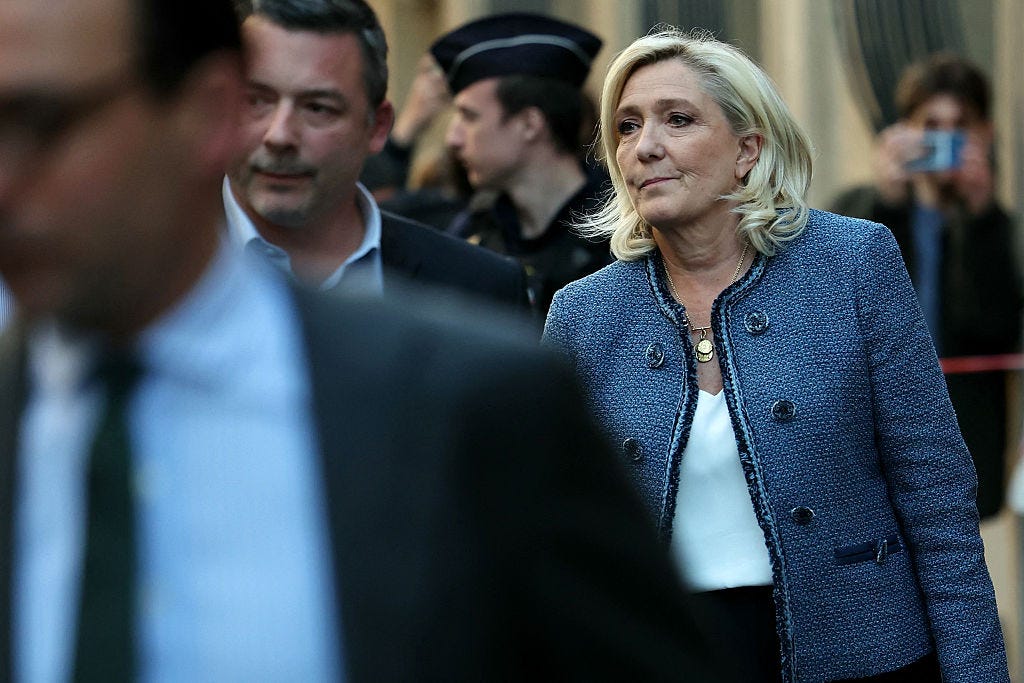Produced by ElevenLabs using AI narration
How do you build something that lasts? How do you build an institution that isn’t about a single person or one moment in time—but about a broader mission bigger than any individual or news story?
You do it by working with people of the highest integrity. People who are honest. People who admit when they are wrong. People who are curious about the world as it actually is. People who marry the quality of the old world to the freedom of the new. People who seek the truth and tell it plainly. People who keep cool heads in an increasingly hot moment and—crucially!—never lose their sense of humor.
Today, we’re thrilled to announce a new lineup of extraordinary voices who embody these virtues: Tyler Cowen, Jed Rubenfeld, Coleman Hughes, Matthew Continetti, and Batya Ungar-Sargon.
We’re also expanding the fiefdoms of other writers we love.
Before I get into that I just want to say: In just a few years, The Free Press has become America’s most important home for the politically homeless, for the coalition of the sane, for those who hunger for honesty and truth.
That is thanks only to you, our subscribers.
You have made The Free Press a thriving community where ideas, principles, and common sense are of the highest worth. And you have enabled us to add some of the most enlightening and provocative minds to our team. We are enormously grateful.
We have much more to announce in the coming months—podcasts and events and special projects that will help you think for yourself and connect you to us, to each other, and to something built to last.
But for now, please allow me to introduce. . .
Tyler Cowen has a mind unlike any I’ve ever encountered. He is best known for his work as an economist; he is a professor at George Mason University and the author of over a dozen books. But what makes Tyler truly unique is the expanse of his interests. In a single conversation, it’s not at all unusual for him to toggle between DeepSeek, GLP-1s, Haitian art, sacred Tibetan music, his favorite Thai spot in L.A., and LeBron James. (For a sense of what I mean, read this profile of Tyler in The Economist’s 1843 magazine.)
That ability to connect seemingly disparate things into a new mode of understanding—and his pure love of learning—is something that has made him one of my longtime intellectual heroes.
We’re calling his column Tyler Cowen Must Know—a nod to his voracious curiosity. He will be writing weekly, but given his metabolism, we are anticipating more.
And he’s starting. . . right now, with an explanation of why he is joining our team.
Today’s piece opens with something he said to me—something that kind of scared me:
Because The Free Press is a start-up, it can fail. Many people do not like that fact about start-ups, because they do not want to be part of a possible failure. It means disruption, and also the paycheck stops coming. But I enjoy the risk appetite. It is precisely because it can fail that the people here will work harder, and likely smarter, than the competition.
That it is a start-up is not only true in fact, but you sense it the moment you walk into the newsroom. . . Continue reading Tyler’s first column here.
Since Trump took office a little over two months ago, I’ve called Jed Rubenfeld more times than I’ve called my own parents. What should we make of the deportation of Mahmoud Khalil? How should we understand Trump’s war on Big Law? And why are Republicans furious with Justice Amy Coney Barrett? No one is better situated to answer those questions—and the subject of law and lawfare—than Jed.
Jed Rubenfeld is a professor of law at Yale Law School. His subjects are constitutional law, privacy, the First Amendment, and criminal law. He is the author of three seminal legal books and two novels, and is on the highly endangered species list: He is an academic who knows how to write.
Jed’s column will appear every other week.
Since Coleman Hughes burst onto the scene at 23 years old, testifying before Congress opposite Ta-Nehisi Coates on the subject of reparations, he has exhibited a wisdom and composure far beyond his years. His essays on race, culture, philosophy, and public policy have been among the most important we have published.
Now we are thrilled to announce that Coleman is bringing his podcast, Conversations with Coleman, to The Free Press. You can expect his special brand of inquiry—curious, rigorous, and preternaturally calm—to start in the weeks ahead.
There is no one in American life better situated to explain the origins, divisions, and future of the American Right than Matthew Continetti. His book The Right: The Hundred-Year War for American Conservatism, is already a classic. With the Republican Party not just in power but going through a generational transformation, he is essential to understanding its successes—and the fault lines that lurk beneath the surface. In addition to his writing for us, Matt is director of domestic policy studies at the American Enterprise Institute.
He will write for us weekly.
Batya is a familiar face at The Free Press, but now she will be a regular columnist. Few saw the Trump phenomenon coming. Even fewer were able to articulate why it was coming. Batya Ungar-Sargon did both—and captured the burgeoning MAGA movement in her important book Second Class: How the Elites Betrayed America’s Working Men and Women. In our pages, she’ll bring her reporting and analysis to illuminate the important issues of class, culture, and our political realignment.
Find her here every other week.
If you want to support what we do—and make sure that we continue to grow—become a paid subscriber today.
We’re also proud to welcome a group of outstanding thinkers and writers who have been contributing to The Free Press, but will now do so on a regular and consistent basis:
A brilliant political scientist, Ruy Teixeira has been a student of the left and the Democratic Party for 40 years. Ruy will be our guide to understanding the state and future of the party and its politics every other week.
Gurri’s book, The Revolt of the Public, is among the most important of this century. A former CIA analyst, Martin is a truly independent thinker and is currently obsessed with the state of populist movement here and around the world. He’ll be a regular monthly contributor.
At a time when few remember their history—or the context of the present—Chuck Lane’s voice is vital. His analysis on politics, economics, and legal issues emphasizes practical solutions over ideology—and never accepts partisan narratives at face value. He’ll be in these pages every other week.
No one has a sharper eye for the glories and absurdities of our popular culture than Suzy. Whether writing about Timothée Chalamet, sleepovers, or luminary rabbis, she sees through the BS and makes us laugh our heads off. You can expect Suzy covering culture in your inbox every Saturday. (And in case you missed it, read her maiden column, on Snow White, woke preppers, David Blaine, and more.)
These names join those you already love and trust: TGIF czarina Nellie Bowles; historians Niall Ferguson, Victor Davis Hanson, and Eli Lake; reporters such as Matti Friedman and Abigail Shrier; and cultural critics such as Larissa Phillips and Kat Rosenfield. Plus—and perhaps most importantly—our staff reporters, who are the hardest-working journalists in the business.
Head to our newsletters page, where you can opt in to receive every piece your favorite new columnists write.
As always, if you have ideas on other topics or columnists, please send comments and suggestions to [email protected].
And with that: Let’s get to the news.
Jay Bhattacharya on Honestly: “Fauci’s Pardon Is a Good Thing.”
On the latest episode of Honestly, I speak exclusively to Jay Bhattacharya, whose first day as head of the National Institutes of Health was Monday.
It’s something of a karmic moment: For opposing the conventional wisdom of Covid lockdowns—most famously in the Great Barrington Declaration—Jay was pilloried by the public health establishment. And not by just anyone: Francis Collins, who was director of the NIH at the time, called him “fringe” and “dangerous.”
And now? Now Jay’s running the NIH.
In his first interview since his confirmation, I asked him about everything. Has he spoken to Collins? Does he believe Anthony Fauci should be pardoned? What does he think of RFK Jr.? Is he worried about vaccine hesitancy? And how does he plan not just to run the NIH, but to restore trust in public health more broadly?
For all that and much more—including whether Jay believes in karma—click the play button below, or follow Honestly wherever you get your podcasts.
And if you want to get straight to the newsiest things Jay said, read this write-up from Maya Sulkin.
The Editors: No Deportations Without Due Process
Last week, a video clip emerged of masked men and women in dark clothes approaching a woman who was standing on a Massachusetts sidewalk. They tied her hands behind her back and hustled her into a car. Eyewitnesses feared they were watching a kidnapping.
In reality, they were witnessing the arrest of Rumeysa Ozturk, a 30-year-old Turkish doctoral student at Tufts University, by plainclothes federal immigration officers.
Her crime, as far as could be determined at the time, was that she co-authored an op-ed in 2024 for The Tufts Daily that urged the university’s president to divest assets from Israel and assert that Israel’s defensive war against Hamas is a “genocide.”
That is about the only thing that the public knows about the Ozturk case. Is there more to the story? We asked the State Department.
Read our editorial and find out what they told us.
ICYMI: The Free Press’s Gabe Kaminsky had the scoop on the Trump administration investigating $9 billion in funding for Harvard over antisemitism. Read it here.
Tune In Tonight: Frannie Block on How One Town Turned a Child’s “Cry For Help” Into a Hate Crime
On Saturday, we published Frannie Block’s explosive piece about Mike Klotz, whose family was driven out of their hometown in Evanston, Illinois, after his 12-year-old son was falsely accused of being complicit in a hate crime. At the heart of the accusation were three ropes, hanging in a tree. The superintendent of the school district said they were “nooses.” The police found that they were a “cry for help.” But the truth didn’t matter: The boy had already been branded a racist.
Many of you were as shocked by this story as we were, and wanted to learn more. Now you can.
This evening, exclusively for paid subscribers of The Free Press, Frannie will sit down with Klotz for a livestream about his family’s ordeal.
Come to our website at 5 p.m. ET to watch the conversation.
If you aren’t a paid subscriber, that’s easily remedied: Click the button below to sign up:
Marine Le Pen had aimed to be elected the next president of France in 2027. But yesterday, the leader of France’s right-wing National Rally party was barred from running for public office for the next five years, after a court found her guilty of embezzling European parliament funds. Some are calling it justice; others are calling it lawfare. Le Pen will appeal the decision—and has vowed to keep fighting.
The bodies of three U.S. Army soldiers have been recovered in Lithuania after their vehicle was swallowed by a peat bog. The announcement, last Tuesday, that the service members were missing prompted some to ask: What are American soldiers doing in Lithuania anyway? The short answer is: The Baltic state is part of NATO, and these men were part of a training exercise with its military. At the time of writing, one body was yet to be recovered.
On Wednesday, which he has dubbed “Liberation Day,” Trump will unveil a massive reciprocal tariff plan. Explaining the scheme to reporters on Sunday night, the president said the tariffs would target “essentially all of the countries we’re talking about.” It’s unclear which countries he’s talking about. India? France? Australia? People are placing bets on Polymarket because nobody knows.
The two NASA astronauts who were stranded in space for nine months—because of technical issues with a Boeing Starliner spacecraft—insisted yesterday on Fox News that they had never been “abandoned” or “marooned.” Two weeks ago, the pair returned to Earth on a SpaceX craft—after Trump claimed the Biden administration had refused to ask the Elon Musk–owned company to help for “political reasons.” But in their first interview since getting home, the astronauts agreed, “In the big scheme of things, we weren’t stuck,” and said they’d definitely fly on the Boeing Starliner again.
Elon Musk suggested Sunday night that DOGE’s next move might be investigating how lawmakers have become “strangely wealthy” despite their relatively modest salaries. “How do they get $20 million if they’re earning $200,000 a year?” Musk asked at a town hall in Wisconsin. “We’re going to try to figure it out and certainly stop it from happening.”

 By The Free Press | Created at 2025-04-01 10:10:14 | Updated at 2025-04-02 16:51:18
1 day ago
By The Free Press | Created at 2025-04-01 10:10:14 | Updated at 2025-04-02 16:51:18
1 day ago

















